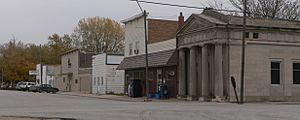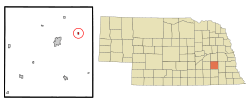Garland, Nebraska facts for kids
Quick facts for kids
Garland, Nebraska
|
|
|---|---|
|
Village
|
|

Downtown Garland, October 2011
|
|

Location of Garland, Nebraska
|
|
| Country | United States |
| State | Nebraska |
| County | Seward |
| Area | |
| • Total | 0.17 sq mi (0.43 km2) |
| • Land | 0.17 sq mi (0.43 km2) |
| • Water | 0.00 sq mi (0.00 km2) |
| Elevation | 1,575 ft (480 m) |
| Population
(2020)
|
|
| • Total | 210 |
| • Density | 1,250.00/sq mi (483.64/km2) |
| Time zone | UTC-6 (Central (CST)) |
| • Summer (DST) | UTC-5 (CDT) |
| ZIP code |
68360
|
| Area code(s) | 402 |
| FIPS code | 31-18230 |
| GNIS feature ID | 2398945 |
Garland is a small village in Seward County, Nebraska, United States. It used to be called Germantown. Garland is part of the larger Lincoln, Nebraska area. In 2010, about 216 people lived there.
Contents
A Look at Garland's History
Building the Railroad in Seward County
In 1874, the Midland Pacific Railroad built the first train tracks in Seward County. These tracks connected Lincoln to Seward. The railroad needed money to build this new line. They asked the county for financial help.
However, people in the southern part of the county voted against giving money in 1871. They were not happy because an earlier train line had skipped their area. They also did not think this new line would help them. Plus, they were upset that Seward had become the county seat instead of their town, Milford.
Because the bond issue failed, the railroad looked for support from the northern parts of the county. Instead of building along the Middle Creek valley, they agreed to build the line through Malcolm. Then, it would go into the hills of northeastern Seward County. This plan helped get enough votes for the bonds to be approved in 1872.
How Germantown Began
After the railroad was built, a train station was set up in a flat area along the tracks. In 1874, a town was planned there by Hiland Fraisure. It was named Germantown because many of the local settlers were of German background.
Changing the Town's Name
When the United States joined World War I, many people felt strongly against anything German. German-language newspapers were shut down. German church services were stopped. Even sauerkraut was called "liberty cabbage."
Because of these strong feelings, the Germantown city council decided to change the town's name. They wanted to rename it after the first local soldier who died during the war. Several residents later died in battle. However, the council's decision did not say how the soldier had to die.
So, the honor went to Raymond Garland. He died from pneumonia before he even reached France. On December 11, 1918, about a month after the war ended, Germantown officially became Garland.
Garland's Location and Size
Garland is a small village. According to the United States Census Bureau, the village covers about 0.17 square miles (0.43 square kilometers). All of this area is land, with no water.
People Living in Garland
Population Changes Over Time
The number of people living in Garland has changed over the years. Here is a quick look at the population from different census counts:
| Historical population | |||
|---|---|---|---|
| Census | Pop. | %± | |
| 1880 | 7 | — | |
| 1890 | 142 | 1,928.6% | |
| 1900 | 194 | 36.6% | |
| 1910 | 275 | 41.8% | |
| 1920 | 279 | 1.5% | |
| 1930 | 228 | −18.3% | |
| 1940 | 205 | −10.1% | |
| 1950 | 184 | −10.2% | |
| 1960 | 198 | 7.6% | |
| 1970 | 244 | 23.2% | |
| 1980 | 257 | 5.3% | |
| 1990 | 247 | −3.9% | |
| 2000 | 247 | 0.0% | |
| 2010 | 216 | −12.6% | |
| 2020 | 210 | −2.8% | |
| U.S. Decennial Census | |||
Garland's Population in 2010
The census in 2010 counted 216 people living in Garland. There were 91 households and 58 families. This means there were about 1,271 people per square mile (491 people per square kilometer).
Most of the people living in Garland were White (98.6%). A small number were African American (0.9%) or Asian (0.5%).
Households and Families
Out of the 91 households:
- 26.4% had children under 18 living with them.
- 57.1% were married couples living together.
- Only a few households had a single parent.
- About 29.7% of all households were made up of individuals living alone.
- 14.3% of households had someone aged 65 or older living by themselves.
- The average household had 2.37 people.
- The average family had 3.02 people.
Age Groups in Garland
The average age in the village was 43 years old.
- 21.8% of residents were under 18.
- 7% were between 18 and 24.
- 22.6% were between 25 and 44.
- 27.2% were between 45 and 64.
- 21.3% were 65 years or older.
The population was almost evenly split between males (51.9%) and females (48.1%).
Well-Known People from Garland
- Arland F. Christ-Janer was the 6th President of Boston University.
- Ted Kooser, a famous American poet, lives in Garland. He was even a Poet Laureate for the Library of Congress.
See also
 In Spanish: Garland (Nebraska) para niños
In Spanish: Garland (Nebraska) para niños
 | Toni Morrison |
 | Barack Obama |
 | Martin Luther King Jr. |
 | Ralph Bunche |

